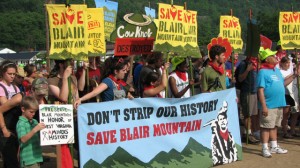This article was originally published on TruthDig.
Chris Hedges will appear on Moyers & Company this weekend. Watch a preview »
Joe Sacco and I, one afternoon when we were working in southern West Virginia on our book Days of Destruction, Days of Revolt, parked our car on the side of a road. We walked with Kenny King into the woods covering the slopes of Blair Mountain. King is leading an effort to halt companies from extracting coal by blasting apart the mountain, the site in the early 1920s of the largest armed insurrection in the United States since the Civil War.
Blair Mountain, amid today’s rising corporate exploitation and state repression, represents a piece of American history that corporate capitalists, and especially the coal companies, would have us forget. It is a reminder that citizens have a right to resist a corporate machine intent on subjugating them. It is a reminder that all the openings of our democracy were achieved with the toil, anguish and sometimes blood of radicals and popular fronts, from labor unions to anarchists, socialists and communists. But this is not approved history. We are instructed by the power elite to worship at approved shrines — plantation estates erected for wealthy slaveholders and land speculators such as George Washington, or the gilded domes of authority in the nation’s capital.
As we walked, King, a member of the Friends of Blair Mountain, an organization formed to have the site declared a national park, swept a metal detector over the soil. When it went off he knelt. He dug with a trowel until he unearthed a bullet casing, which he handed to me. I recognized it as a .30-30, the kind of ammunition my grandfather and I used when we hunted deer in Maine. Winchester lever-action rifles, which took the .30-30 round, were widely used by the rebellious miners.
In late August and early September 1921 in West Virginia’s Logan County as many as 15,000 armed miners, some of them allegedly provided with weapons by the United Mine Workers of America, mounted an insurrection after a series of assassinations of union leaders and their chief supporters, as well as mass evictions, blacklistings and wholesale firings by coal companies determined to break union organizing. Miners in other coal fields across the United States had concluded a strike that lasted two months and ended with a 27-percent pay increase. The miners in West Virginia and eastern Kentucky wanted the same. They wanted to be freed from the debt peonage of the company stores, to be paid fairly for their work, to have better safety in the mines, to fight back against the judges, politicians, journalists and civil authorities who had sold out to Big Coal, and to have a union. They grasped that unchallenged and unregulated corporate power was a form of enslavement. And they grasped that it was only through a union that they had any hope of winning.


